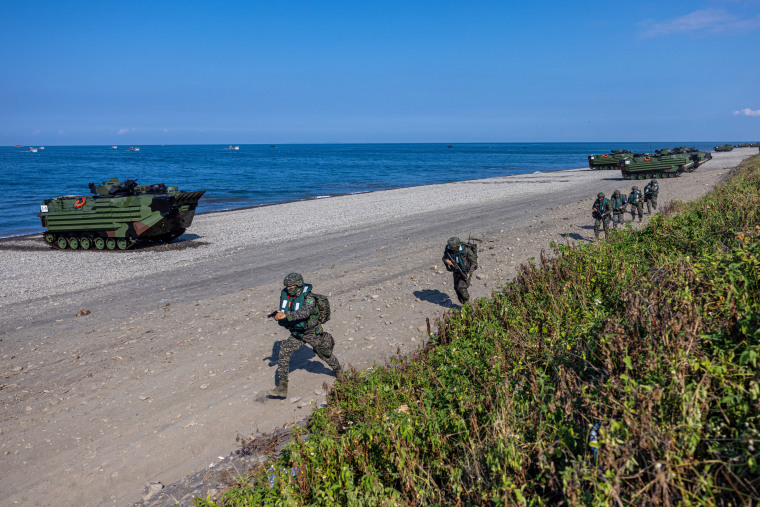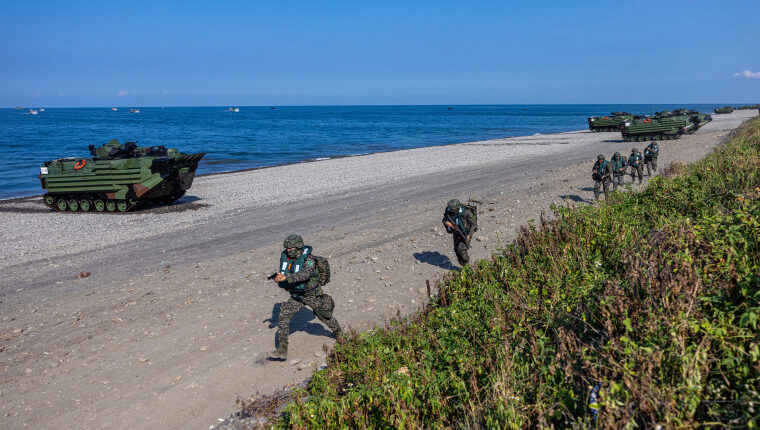Where does the U.S. stand?
The U.S. switched diplomatic recognition from Taipei to Beijing in 1979, hoping that China could serve as a counterweight to the Soviet Union at a time when the Cold War drove foreign policy decisions. Under the “one-China policy,” Washington acknowledges Beijing’s position that Taiwan is part of China without endorsing it, and maintains unofficial relations with Taipei.
That same year, Congress passed the Taiwan Relations Act, which requires the U.S. to provide Taiwan with defensive weapons and makes clear that Washington established diplomatic ties with Beijing with the expectation that Taiwan’s future would be determined peacefully.
China views such arms sales, as well as official contact such as the meeting between McCarthy and Tsai, as provocations and a violation of Washington’s one-China policy.
What would the U.S. do if China invaded?
The short answer is, we don’t know.
The U.S. has a longstanding policy of “strategic ambiguity” on how it would respond if China invaded Taiwan, the idea being to deter China from invading and discourage Taiwan from doing something — like declaring independence — that might provoke a Chinese military response.
But some U.S. lawmakers are pushing for a more explicit U.S. commitment, and President Joe Biden has made comments at least four times that appear to contradict current policy.

In a 2022 “60 Minutes” interview on CBS, for example, Biden responded “yes” when asked whether U.S. forces would defend Taiwan against a Chinese attack.
As in earlier cases, the White House later walked back those comments, saying that U.S. policy toward the island has not changed.
“I think if that happens four times, then it’s not a gaffe or a mistake,” said Brian Hart, a fellow with the China Power Project at the Center for Strategic and International Studies in Washington.
“My interpretation of that is President Biden trying to signal his own personal thinking on the issue and to, I think, level up U.S. deterrence against Chinese aggression against Taiwan and to make clear how big of an issue it is for us,” he said.
So is an invasion imminent?
It’s unlikely in the near future, according to China analysts as well as top military officials.
“I don’t think that an attack on Taiwan is imminent, nor inevitable,” Defense Secretary Lloyd Austin told a House committee in March.
U.S. officials say Xi has ordered his military to have the ability to invade Taiwan by 2027; others have predicted an attack well before then. But capability is not the same as intention, said Yun Sun, director of the China Program at the Stimson Center in Washington.
“By 2027, even if they have the capability, it does not necessarily mean that they are definitely going to fight, considering the political, economic and diplomatic cost of such a war,” she said.
Beijing is also hoping that the U.S. commitment to Taiwan’s security will one day fade, Sun said.
“When that day comes, China does not need to fight because Taiwan doesn’t stand a chance,” she said.
What does this have to do with Ukraine?
Russia’s invasion of Ukraine last year quickly raised questions as to how it would affect China’s calculus on Taiwan.
China rejects comparisons between Ukraine and Taiwan, arguing that any Chinese use of force against Taiwan would not be a violation of national sovereignty because Taiwan is part of China. But it is still likely to be drawing lessons from Russia’s experience.
“It makes the Chinese realize that the war [in Taiwan] may not be so easily and quickly won as they would like,” Sun said.
Experts say China might also consider the high levels of support, including military assistance, that Ukraine has received from democracies around the world.
The response shows that “the Western world is prepared to take some risks and pay some costs to support a friend that it believes in,” said Michael O’Hanlon, director of research in foreign policy at the Brookings Institution in Washington.
Courtney Kube reported from Taipei, Megan Lebowitz from Washington, and Jennifer Jett from Hong Kong.
Source: | This article originally belongs to Nbcnews.com










